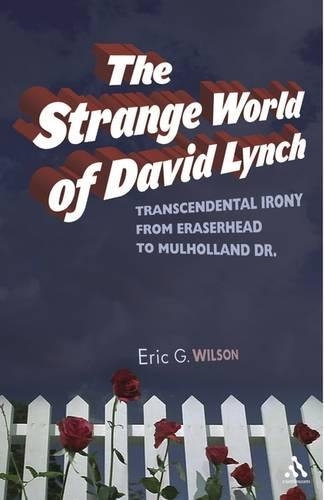
The Strange World of David Lynch: Transcendental Irony from Eraserhead to Mulholland Dr.
(Paperback)
Publishing Details
The Strange World of David Lynch: Transcendental Irony from Eraserhead to Mulholland Dr.
By (Author) Eric G. Wilson
Bloomsbury Publishing PLC
Continuum International Publishing Group Ltd.
30th July 2007
United Kingdom
Classifications
General
Non Fiction
791.430233092
Physical Properties
Paperback
192
Width 138mm, Height 216mm
256g
Description
Anyone who has sat through the dark and grainy world of Eraserhead knows that David Lynch's fi lms pull us into a strange world where reality turns upside down and sideways. His fi lms are carnivals that allow us to transcend our ordinary lives and to reverse the meanings we live with in our daily lives. Nowhere is this demonstrated better than in the opening scene of Blue Velvet when our worlds are literally turned on their ears.
Lynch endlessly vacillates between Hollywood conventions and avant-garde experimentation, placing viewers in the awkward position of not knowing when the image is serious and when it's in jest, when meaning is lucid or when it's lost. His vexed style in this way places form and content in a perpetually self-consuming dialogue. But what do Lynch's fi lms have to do with religion Wilson aims to answer that question in his new book, The Strange World of David Lynch.
To say that irony (especially of the kind found in Lynch's fi lms) generates religious experience is to suggest religious can be founded on nihilism. Moreover, in claiming Lynch's fi lms are religious, one must assume that extremely violent and lurid sexual films are somehow expressions of energies of peace, tranquility, and love. Wilson illuminates not only Lynch's fi lm but also the study of religion and fi lm by showing that the most profound cinematic experiences of religion have very little to do with traditional belief systems. His book offers fresh ways of connecting the cinematic image to the sacred experience.
Reviews
Eric G. Wilson quotes Rosselini's remark in The Strange World of David Lynch: Transcendental Irony from Eraserhead to Mullholand Drive, which locates a wealth of spiritual meanings, connotations, and implications in five Lynch films. Wilson isn't the first scholar to look at Lynch in religious terms but he may be the most thoroughgoing and inventive. Nobody is suggesting that the pictures at handall utterly original, hugely audacious, and fearlessly bizarreare Methodist Allegories, evangelical screeds, or coded Rosicrucian messages. What they do add up to, Wilson argues, is a body of "sacred "secular cinema" informed by a radical religiosity that enables Lynch to avoid two common philosophical mistakes: dualism, which divides the world into opposites like good-evil and order-chaos, and monism, which reduces the cosmos to some undifferentiated unity- all is material, all is spiritual, all is whatever. Lynch has pursued an open- ended journey into what Wilson calls transcendental irony, appearance and reality, creation and destruction, desire and fulfillment, nature and artifice, conscious and unconscious, form and formlessness, and all the multifaceted "antinomies of existence" of which a sensitively attunes spirit is exhilaratingly aware. ...Wilson throws in Transcendental Meditation, which Lynch learned from Maharishi Mahesh Yogi, the mantra-chanting guru who enlightened the Beatles a few decades ago. Lynch inconveniently insists that his films have nothing to do with religion, but this doesn't slow Wilson down for a second. It's just a neat example of the "earnest playfulness" that makes Lynch so, well, Lynchian. I don't mean to be facetious but if I do sound that way, chalk it up to the persuasive power of Wilson's own arguments, which are too serious to take themselves too seriously. A critic who admires Lynch for dodging the traps of monistic and dualistic thinking can't afford to fall into those very pitfalls, and since cinema scholarship spends a good deal of its time down there, Wilson wisely staves off error by deploying a film-theoretical version of earnest playfulness. In the introduction to his book, for instance, he lays out the ideas I've outlined and plausible applies them to scenes in Lynch movies. Whatever you think of Wilson's overall approach, you have to be charmed by his good-natured candor and respect for ambiguity, which lend wonder and surprise to his analyses of enigmas, aporias, and impossibilities in Lynch's films. Wilson's book was finished before Lynch completed Inland Empire, that may well stand as his very greatest work. Unfazed as always by empirical "reality," Wilson writes about the picture anyway, predicting that it will explore "the imperial interiors that stay forever unmapped," sounding "the abmysal insides of the heart" to their profoundest depths. You read it right, folks: Wilson has written one of that film's most astute descriptions without seeing a single frame. It seems his ridiculous hermeneutics are just what's needed for opening our eyed to a mystical "third term" surpassing the divide " between many and one , chaos and ordera barely possible thing as lurid and gorgeous as Blue Velvet wavering in the muted light." -- popmatters.com
Author Bio
Eric Wilson is Professor of English at Wake Forest University, USA. His publications include Secret Cinema: Gnostic Vision in Film (2006), The Strange World of David Lynch: Transcendental Irony from Eraserhead to Mulholland Dr (2007). His writing has featured in Psychology Today, L.A. Times, The New York Times and Huffington Post.
